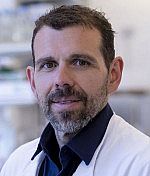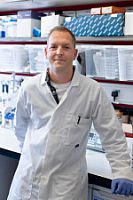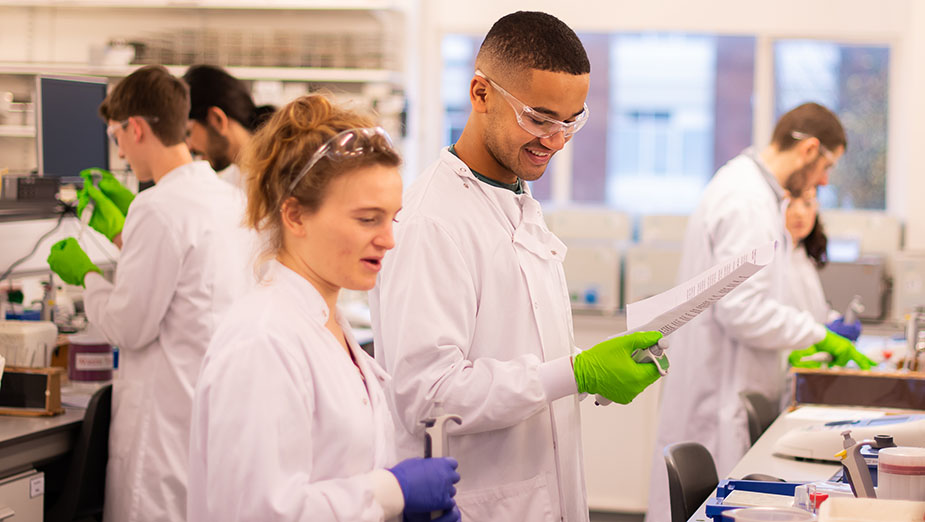Key information
- Duration:
- 3 years full time
- Typical A-level offer:
- ABB
View full entry requirements - UCAS code:
- C700
- Start date:
- September 2025
- 94% of our research overall in Biological Sciences was assessed to be world leading or internationally excellent (REF 2021)
What are the mechanisms of life?
Studying Biochemistry at Sussex, you’ll explore this question. Taught by leading biochemists and chemists, you’ll:
- study life at the molecular scale
- explore the chemical processes underpinning the activities of cells and organisms
- discover what happens when things go wrong, leading to diseases such as cancer
- find out how biochemistry can help us develop new therapeutics.
From Year 1, you’ll be in the lab gaining hands-on practical skills, recording, analysing and interpreting data from your experiments. You’ll learn about current theories in the field, communicating complex topics and working as part of a team.
The course is informed by the latest research. It’s flexible so you can tailor your degree to your interests and career aspirations. You’ll be inspired by modules in areas such as medicinal chemistry, drug discovery, cell signalling and neuroscience. You’ll be supported by a friendly community of scientists in the School of Life Sciences. Our student mentoring programme can also provide you with academic support should you need it.
When you graduate, you’ll have skills in:
- purifying and analysing key biomolecules such as nucleic acids and enzymes
- exploring genomics data
- carrying out your own research project.
With such skills, a variety of careers are open to you, in the pharmaceutical or biotechnology industries, or within forensics. Your data-handling and analytical skills mean you could develop a career both inside and outside of science.
We understand that deciding where and what to study is a very important decision. We’ll make all reasonable efforts to provide you with the courses, services and facilities described in this prospectus. However, if we need to make material changes, for example due to government or regulatory requirements, or unanticipated staff changes, we’ll let you know as soon as possible.
MSci or BSc?
We also offer this course with an industrial placement year, or as a four-year MSci. Find out about the benefits of an integrated Masters year.
I really liked the lab work. I was able to make well-known compounds – not every student can say that!”Roos Bruggink
Biochemistry (with an industrial placement year) BSc graduate
Open Days and virtual visits
Meet us on campus or online
Entry requirements
A-level
| Typical offer | ABB |
|---|---|
| Contextual offer | View contextual offer Not everyone has the same support to get to higher education – we help you reach your potential. When we receive applications through UCAS, we consider all factors and will sometimes make contextual offers as part of our Access and Participation Plan |
| Subjects | A-levels must include Biology and Chemistry. You will also need to pass the separate science practical assessment. If you are not able to take the science practical assessment, applications will be considered on a case-by-case basis. |
| GCSEs | You will normally need GCSE (or equivalent) Mathematics and two Science subjects with grade 5 in each (or grade B). |
| Extended Project Qualification | We take the EPQ into account when considering your application and it can be useful in the summer when your results are released if you have narrowly missed the conditions of your offer. We do not routinely include the EPQ in the conditions of your offer but we sometimes offer alternative conditions that include the EPQ. If you wish to discuss this further please contact us |
Other UK qualifications
Access to HE Diploma
| Typical offer | Pass Diploma with at least 39 level 3 credits at Merit or above including 24 credits at Distinction |
|---|---|
| Subjects | The Access to HE Diploma will need to be in Science and contain substantial amounts of Level 3 credits in both Biology and Chemistry. |
| GCSEs | You will normally need GCSE (or equivalent) Mathematics and two Science subjects with grade 5 in each (or grade B). |
Cambridge Pre-U Principal Subjects (including A-level mixes)
| Typical offer | M1 M2 M2 If you have one A-level and two Cambridge Pre-U Principal Subjects we would expect you to have grade A at A-level and, M2 and M2 in two Pre-Us. If you have two A-levels and a Cambridge Pre-U Principal Subject we would normally expect you to have grades AB at A-level and M2 in Pre-U. |
|---|---|
| Subjects | A-levels or Cambridge Pre-U Principal Subjects must include both Biology and Chemistry. If you are taking a science subject at A-level that has the separate science practical assessment, we would normally expect a pass. If you are not able to take the science practical assessment, your application will be considered on a case-by-case basis. |
| GCSEs | You will normally need GCSE (or equivalent) Mathematics and two Science subjects with grade 5 in each (or grade B). |
International Baccalaureate
| Typical offer | 32 points overall from the full IB Diploma. |
|---|---|
| Subjects | Higher Levels must include both Biology and Chemistry, with a grade of at least 5. |
Pearson BTEC Level 3 National Diploma and one A-level
| Typical offer | Grade B in A-level and Distinction, Distinction in Pearson BTEC Level 3 National Diploma.
|
|---|---|
| Contextual offer | View contextual offer Not everyone has the same support to get to higher education – we help you reach your potential. When we receive applications through UCAS, we consider all factors and will sometimes make contextual offers as part of our Access and Participation Plan |
| Subjects | A-level must be in Chemistry and the BTEC will need to be Applied Science (with good levels of Biology). You will also normally need to pass the separate science practical assessment in Chemistry. If you are not able to take the science practical assessment, applications will be considered on a case-by-case basis. |
| GCSEs | You will normally need GCSE (or equivalent) Mathematics and two Science subjects with grade 5 in each (or grade B). |
Pearson BTEC Level 3 National Extended Certificate and two A-levels
| Typical offer | Grades BB in A-levels and Distinction in BTEC Level 3 National Extended Certificate. |
|---|---|
| Contextual offer | View contextual offer Not everyone has the same support to get to higher education – we help you reach your potential. When we receive applications through UCAS, we consider all factors and will sometimes make contextual offers as part of our Access and Participation Plan |
| Subjects | A-levels must include both Biology and Chemistry. You will also normally need to pass the separate science practical assessment in Chemistry. If you are not able to take the science practical assessment, applications will be considered on a case-by-case basis. |
| GCSEs | You will normally need GCSE (or equivalent) Mathematics and two Science subjects with grade 5 in each (or grade B). |
Pearson BTEC Level 3 National Extended Diploma (formerly BTEC Level 3 Extended Diploma)
| Typical offer | DDD |
|---|---|
| Contextual offer | View contextual offer Not everyone has the same support to get to higher education – we help you reach your potential. When we receive applications through UCAS, we consider all factors and will sometimes make contextual offers as part of our Access and Participation Plan |
| Subjects | The Pearson BTEC Level 3 National Extended Diploma will need to be in Applied science and must include the following modules For the BTEC Level 3 Extended Diploma, please contact admissions ug.applicants@sussex.ac.uk |
| GCSEs | You will normally need GCSE (or equivalent) Mathematics and two science subjects with grade 5 in each (or grade B). |
Scottish Highers
| Typical offer | ABBBB |
|---|---|
| Subjects | Highers must include both Biology and Chemistry. Ideally, you will also have an Advanced Higher in Chemistry (grade B). |
| GCSEs | You will also need Scottish National 5 in Mathematics and two sciences at grade B. |
T Level
| Typical offer | The T Level in Science will be considered on a case-by-case basis |
|---|---|
| GCSEs | You will also need GCSE (or equivalent) in Mathematics and two science subjects with grade 5 in each (or grade B) |
Welsh Baccalaureate Advanced
| Typical offer | ABB from the Advanced Welsh Baccalaureate Skills Challenge Certificate and two A-levels |
|---|---|
| Subjects | A-levels must include both Biology and Chemistry. |
| GCSEs | You will normally need GCSE (or equivalent) Mathematics and two Science subjects with grade B in each (or grade 5). |
International Baccalaureate
| Typical offer | 32 points overall from the full IB Diploma. |
|---|---|
| Subjects | Higher Levels must include both Biology and Chemistry, with a grade of at least 5. |
European Baccalaureate
| Typical offer | Overall result of at least 77% |
|---|---|
| Additional requirements | Evidence of existing academic ability in both Biology and Chemistry is essential (normally with a final grade of at least 8.0). Also you should have a good level of Mathematics. |
Other international qualifications
Australia
| Typical offer | Relevant state (Year 12) High School Certificate, and 85% in the ATAR or UAI/TER/ENTER, or a Queensland OP of 5 or better. |
|---|---|
| Additional requirements | Evidence of existing academic ability in Chemistry is essential. You must also have a good level of Mathematics.
|
Austria
| Typical offer | Reifeprüfung or Matura with an overall result of 2.2 or better for first-year entry. |
|---|---|
| Additional requirements | Evidence of existing academic ability in Chemistry is essential. You must also have a good level of Mathematics. Our entry requirements are guidelines and we assess all applications on a case-by-case basis. |
Belgium
| Typical offer | Certificat d'Enseignement Secondaire Supérieur (CESS) or Diploma van Hoger Secundair Onderwijs with a good overall average of 65% or more. |
|---|---|
| Additional requirements | Evidence of existing academic ability in Chemistry is essential. You must also have a good level of Mathematics. Our entry requirements are guidelines and we assess all applications on a case-by-case basis. |
Bulgaria
| Typical offer | Diploma za Sredno Obrazovanie with excellent final-year scores (normally 5.5 overall with 6 in key subjects). |
|---|---|
| Additional requirements | Evidence of existing academic ability in Chemistry is essential. You must also have a good level of Mathematics. Our entry requirements are guidelines and we assess all applications on a case-by-case basis. |
Canada
| Typical offer | Ontario Secondary School Diploma (OSSD) 70% from 6 grade 12 U, U/C or M courses. British Columbia Certificate of Graduation BBBBB from 5 grade 12 courses. We also recognise the High School Diploma from other provinces -including Alberta, Manitoba, New Brunswick- where we look for strong performance in grade 12 subjects, and the Diplome d'Etudes Collegiales (DEC) from Quebec. |
|---|---|
| Additional requirements | Evidence of existing academic ability in Chemistry is essential. You must also have a good level of Mathematics. Our entry requirements are guidelines and we assess all applications on a case-by-case basis. |
China
| Typical offer | If you have the Goakao, we will consider applications for direct entry to first year. You would normally need an overall average of 75%, including required subjects. We are also pleased to consider applications if you are following a recognised International Foundation Year or you have one or more years of Higher Education in China at a recognised degree awarding institution. The Senior High School Graduation alone would not be sufficient for entry to our undergraduate degrees, but you may be eligible to apply for our International Foundation Year. If you successfully complete an International Foundation Year, you can progress on to a relevant undergraduate course at Sussex. Check which qualifications the International Study Centre accepts for the International Foundation Year. |
|---|---|
| Additional requirements | Our entry requirements are guidelines and we assess all applications on a case-by-case basis. |
Croatia
| Typical offer | Maturatna Svjedodžba with an overall score of 4 |
|---|---|
| Additional requirements | Evidence of existing academic ability in Chemistry is essential. You must also have a good level of Mathematics. Our entry requirements are guidelines and we assess all applications on a case-by-case basis. |
Cyprus
| Typical offer | Apolytirion of Lykeion with an overall average of 18/20 will be considered for first-year entry.
|
|---|---|
| Additional requirements | Evidence of existing academic ability in Chemistry is essential. You must also have a good level of Mathematics. Our entry requirements are guidelines and we assess all applications on a case-by-case basis. |
Czech Republic
| Typical offer | Maturita with a good overall average. |
|---|---|
| Additional requirements | Evidence of existing academic ability in Chemistry is essential. You must also have a good level of Mathematics. Our entry requirements are guidelines and we assess all applications on a case-by-case basis. |
Denmark
| Typical offer | Højere Forberedelseseksamen (HF) or Studentereksamen with an overall average of at least 7 on the new grading scale. |
|---|---|
| Additional requirements | Evidence of existing academic ability in Chemistry is essential. You must also have a good level of Mathematics. Our entry requirements are guidelines and we assess all applications on a case-by-case basis. |
Finland
| Typical offer | Pass Ylioppilastutkinto with overall final result of MMMM or better |
|---|---|
| Additional requirements | You must have a good level of Chemistry. Also you should have a good level of Mathematics. Our entry requirements are guidelines and we assess all applications on a case-by-case basis. |
France
| Typical offer | French Baccalauréat with overall final result of 12/20 |
|---|---|
| Additional requirements | You will need to be taking the science strand within the French Baccalauréat with a good result (12/20) in Chemistry. You must also have a good level of Mathematics.
|
Germany
| Typical offer | German Abitur with an overall result of 2.2 or better. |
|---|---|
| Additional requirements | You will need a very good final result in Chemistry (at least 12/15). You must also have a good level of Mathematics.
|
Greece
| Typical offer | Apolytirion with an overall average of 18 will be considered for first-year entry. You must also have either Apolytirion pathway in Chemistry with a score of 19 or the Pan Hellenic in Chemistry with an overall score of 17. |
|---|---|
| Additional requirements | You must also have a good level of Mathematics. Our entry requirements are guidelines and we assess all applications on a case-by-case basis. |
Hong Kong
| Typical offer | Hong Kong Diploma of Secondary Education (HKDSE) with grades of 4, 4, 4 from three subjects including two electives. |
|---|---|
| Additional requirements | Evidence of existing academic ability in Chemistry is essential. You must also have a good level of Mathematics. Our entry requirements are guidelines and we assess all applications on a case-by-case basis. |
Hungary
| Typical offer | Erettsegi/Matura with a good average of at least 55544. |
|---|---|
| Additional requirements | Evidence of existing academic ability in Chemistry is essential. You must also have a good level of Mathematics. Our entry requirements are guidelines and we assess all applications on a case-by-case basis. |
India
| Typical offer | Standard XII results
|
|---|---|
| Additional requirements | Evidence of existing academic ability in Chemistry is essential. You must also have a good level of Mathematics. Our entry requirements are guidelines and we assess all applications on a case-by-case basis. |
Iran
| Typical offer | Where direct entry is unsuitable, we'll automatically consider you for one of our Foundation Years. Or you might want to apply to one of our International Foundation Years at the international Study Centre on Campus. Visit isc.sussex.ac.uk/our-courses/international-foundation-year or www.sussex.ac.uk/study/undergraduate/courses/foundation-years |
|---|---|
| Subject-specific knowledge | Evidence of existing academic ability in Chemistry is essential. You must also have a good level of Mathematics. Our entry requirements are guidelines and we assess all applications on a case-by-case basis. |
| Please note | Our entry requirements are guidelines and we assess all applications on a case-by-case basis. |
Ireland
| Typical offer | Irish Leaving Certificate (Higher Level) at H2,H2,H2,H3,H3. |
|---|---|
| Additional requirements | Highers will need to include Chemistry, normally grade H1. You must have at least grade O3 in Mathematics and two Sciences. |
Israel
| Typical offer | For first year entry at least 80% (or 8/10) in at least 6 subjects, including one 5 unit subject, in one sitting of the Bagrut. |
|---|---|
| Additional requirements | Evidence of existing academic ability in Chemistry is essential. You must also have a good level of Mathematics. Our entry requirements are guidelines and we assess all applications on a case-by-case basis. |
Italy
| Typical offer | Italian Diploma Di Maturità or Diploma Pass Di Esame Di Stato with a final Diploma mark of 78/100 |
|---|---|
| Additional requirements | Evidence of existing academic ability in Chemistry is essential. You must also have a good level of Mathematics. Our entry requirements are guidelines and we assess all applications on a case-by-case basis. |
Japan
| Typical offer | Where direct entry is unsuitable, we'll automatically consider you for one of our Foundation Years. Or you might want to apply to one of our International Foundation Years at the international Study Centre on Campus. Visit isc.sussex.ac.uk/our-courses/international-foundation-year or www.sussex.ac.uk/study/undergraduate/courses/foundation-years |
|---|---|
| Subject-specific knowledge | Evidence of existing academic ability in Chemistry is essential. You must also have a good level of Mathematics. Our entry requirements are guidelines and we assess all applications on a case-by-case basis. |
| Please note | Our entry requirements are guidelines and we assess all applications on a case-by-case basis. |
Latvia
| Typical offer | Atestats par Visparejo videjo Izglitibu with very good grades in state exams. |
|---|---|
| Additional requirements | Evidence of existing academic ability in Chemistry is essential. You must also have a good level of Mathematics. Our entry requirements are guidelines and we assess all applications on a case-by-case basis. |
Lithuania
| Typical offer | Brandos Atestatas including scores of 80% in at least three state examinations (other than English). |
|---|---|
| Additional requirements | Evidence of existing academic ability in Chemistry is essential. You must also have a good level of Mathematics. Our entry requirements are guidelines and we assess all applications on a case-by-case basis. |
Luxembourg
| Typical offer | Pass the Diplome de Fin d’Etudes Secondaires with 43 points overall. |
|---|---|
| Additional requirements | Evidence of existing academic ability in Chemistry is essential. You must also have a good level of Mathematics. Our entry requirements are guidelines and we assess all applications on a case-by-case basis. |
Malaysia
| Typical offer | Sijil Tinggi Persekolahan Malaysia (STPM) with grades of BBB, Matriculation with a least a grade of 3.0 or UEC with an overall average grade B3 (75%). |
|---|---|
| Additional requirements | Evidence of existing academic ability in Chemistry is essential. You must also have a good level of Mathematics. Our entry requirements are guidelines and we assess all applications on a case-by-case basis. |
Netherlands
| Typical offer | Voorereidend Wetenschappelijk Onderwijs (VWO), normally with an average of at least 7. |
|---|---|
| Additional requirements | Evidence of existing academic ability in Chemistry is essential. You must also have a good level of Mathematics. Our entry requirements are guidelines and we assess all applications on a case-by-case basis. |
Nigeria
| Typical offer | You are expected to have one of the following:
You must also have a score of C6 or above in WAEC/SSC English. Where direct entry is unsuitable, we'll automatically consider you for one of our Foundation Years. Or you might want to apply to one of our International Foundation Years at the international Study Centre on Campus. Visit isc.sussex.ac.uk/our-courses/international-foundation-year or www.sussex.ac.uk/study/undergraduate/courses/foundation-years |
|---|---|
| Additional requirements | Evidence of existing academic ability in Chemistry is essential. You must also have a good level of Mathematics. Our entry requirements are guidelines and we assess all applications on a case-by-case basis. |
Norway
| Typical offer | Norwegian Vitnemal Fra Den Videregaende Opplaering - Pass with an overall average of 4. |
|---|---|
| Additional requirements | Evidence of existing academic ability in Chemistry is essential. You must also have a good level of Mathematics. Our entry requirements are guidelines and we assess all applications on a case-by-case basis. |
Pakistan
| Typical offer | You can apply for direct entry to Year 1 if you are completing at least two years of Bachelor degree studies. You'll normally need to complete a Foundation year after taking Intermediate Certificate or the Higher Secondary Certificate (HSC). You might choose one of our International Foundation Years at the International Study Centre on campus. |
|---|---|
| Additional requirements | Evidence of existing academic ability in Chemistry is essential. You must also have a good level of Mathematics. Our entry requirements are guidelines and we assess all applications on a case-by-case basis. |
Poland
| Typical offer | Pass Matura with least 3 Extended level subjects in the 75th percentile including Chemistry.
|
|---|---|
| Additional requirements | You must have a good level of Mathematics. Our entry requirements are guidelines and we assess all applications on a case-by-case basis. |
Portugal
| Typical offer | Diploma de Ensino Secundario normally with an overall mark of 16/20 |
|---|---|
| Additional requirements | Evidence of existing academic ability in Chemistry is essential. You must also have a good level of Mathematics. Our entry requirements are guidelines and we assess all applications on a case-by-case basis. |
Romania
| Typical offer | Diploma de Bacalaureat with an overall average of 8.0 including a score of 8 in Chemistry. |
|---|---|
| Additional requirements | You must have a good level of Mathematics. Our entry requirements are guidelines and we assess all applications on a case-by-case basis. |
Russia
| Typical offer | Applicants who have good grades in the Attestat o Srednem Obrazovami (Certificate of Secondary Education) and who have successfully completed the first year of a Russian University degree, with a minimum GPA of 4.0, will be considered for admission to the first year of our bachelor’s degree courses. |
|---|---|
| Subject-specific knowledge | Evidence of existing academic ability in Chemistry is essential. You must also have a good level of Mathematics. Our entry requirements are guidelines and we assess all applications on a case-by-case basis. |
| Please note | Our entry requirements are guidelines and we assess all applications on a case-by-case basis. |
Singapore
| Typical offer | A-levels, as well as certain certificates and diplomas. |
|---|---|
| Additional requirements | Evidence of existing academic ability in Chemistry is essential. You must also have a good level of Mathematics. Our entry requirements are guidelines and we assess all applications on a case-by-case basis. |
Slovakia
| Typical offer | Pass Vysvedčenie o maturitnej skúške (Maturita) with an average grade above 2.0 from 4 subjects including Chemistry.
|
|---|---|
| Additional requirements | You must also have a good level of Mathematics. Our entry requirements are guidelines and we assess all applications on a case-by-case basis. |
Slovenia
| Typical offer | Secondary School Leaving Diploma or Matura with at least 23 points overall. |
|---|---|
| Additional requirements | Evidence of existing academic ability in Chemistry is essential. You must also have a good level of Mathematics. Our entry requirements are guidelines and we assess all applications on a case-by-case basis. |
South Africa
| Typical offer | National Senior Certificate with very good grades. |
|---|---|
| Additional requirements | Evidence of existing academic ability in Chemistry is essential. You must also have a good level of Mathematics. Our entry requirements are guidelines and we assess all applications on a case-by-case basis. |
Spain
| Typical offer | Spanish Título de Bachillerato (LOGSE) with an overall average result 7.5 |
|---|---|
| Additional requirements | Evidence of existing academic ability in Chemistry is essential. You must also have a good level of Mathematics. Our entry requirements are guidelines and we assess all applications on a case-by-case basis. |
Sri Lanka
| Typical offer | Sri Lankan A-levels. |
|---|---|
| Additional requirements | Evidence of existing academic ability in Chemistry is essential. You must also have a good level of Mathematics. Our entry requirements are guidelines and we assess all applications on a case-by-case basis. |
Sweden
| Typical offer | Fullstandigt Slutbetyg/Högskoleförberedande Examen with a total of 2,500 credits to include B grades in the majority of subjects and to include grade B in Chemistry.
|
|---|---|
| Additional requirements | You must have a good level of Mathematics. Our entry requirements are guidelines and we assess all applications on a case-by-case basis. |
Switzerland
| Typical offer | Federal Maturity Certificate. |
|---|---|
| Additional requirements | Evidence of existing academic ability in Chemistry is essential. You must also have a good level of Mathematics. Our entry requirements are guidelines and we assess all applications on a case-by-case basis. |
Turkey
| Typical offer | We'll consider students who have taken the Lise Diplomasi or Lise Bitirme, with a score of at least 4/5 or 80/100 in their final year, on a case by case basis for direct entry to year 1. Where direct entry is unsuitable, we'll automatically consider you for one of our Foundation Years. Or you might want to apply to one of our International Foundation Years at the international Study Centre on Campus. Visit isc.sussex.ac.uk/our-courses/international-foundation-year or www.sussex.ac.uk/study/undergraduate/courses/foundation-years |
|---|---|
| Additional requirements | Evidence of existing academic ability in Chemistry is essential. You must also have a good level of Mathematics. Our entry requirements are guidelines and we assess all applications on a case-by-case basis. |
USA
| Typical offer | We look at your full profile considering everything you are studying, including the High School Graduation Diploma, Grade 12 GPA, SAT tests and subject tests and/or ACT grades and AP tests. We expect to see a combination of these qualifications. Alongside your High School Graduation Diploma, we would ideally like to see 3 good AP scores with either, a combined SAT test score (evidence-based reading and writing and mathematics) of 1300, or a combined ACT score of 26 AP and SAT Subject tests Please check the individual course pages for our typical A-level offer and see below for the corresponding scores we would require from AP test scores:
We will also accept a combination of any 3 AP tests and SAT subject test where a score of 600 in an SAT subject test can be substituted for an AP test in the above table If you are applying for a degree with an A level subject requirement in Mathematics, Physics, Chemistry or Biology will normally need to hold an AP test in that subject. College level credits We also accept college level 3-credit courses in academic subjects as the equivalent of a UK A Level on a case by case basis. These can be combined with AP tests and or SAT subject tests Associate degrees An Associate degree with a GPA of 3.0 will meet our entry requirements for year 1. Foundation Year entry Students who have a High School Diploma and SAT or ACT tests only would be eligible to apply for our Foundation Year
| ||||||||||
|---|---|---|---|---|---|---|---|---|---|---|---|
| Additional requirements | Evidence of existing academic ability in Chemistry is essential. You must also have a good level of Mathematics. Our entry requirements are guidelines and we assess all applications on a case-by-case basis. |
My country is not listed
If your qualifications aren’t listed or you have a question about entry requirements, contact us
English language requirements
IELTS (Academic)
6.0 overall, including at least 5.5 in each component
Check your IELTS qualification meets all of our language requirements
IELTS scores are valid for two years from the test date. You cannot combine scores from more than one sitting of the test. Your score must be valid when you begin your Sussex course.
We accept IELTS One Skills Retake.
We do not accept IELTS Online.
Other English language requirements
Proficiency tests
Cambridge Advanced Certificate in English (CAE)
169 overall, including at least 162 in each skill
Find out more about Cambridge English: Advanced.
We would normally expect the CAE test to have been taken within two years before the start of your course.
You cannot combine scores from more than one sitting of the test.
Cambridge Certificate of Proficiency in English (CPE)
169 overall, including at least 162 in each skill
Find out more about Cambridge English: Proficiency.
We would normally expect the CPE test to have been taken within two years before the start of your course.
You cannot combine scores from more than one sitting of the test.
Pearson (PTE Academic)
59 overall, including at least 59 in all four skills.
Check your Pearson (PTE Academic) qualification meets all of our language requirements
Find out more about Pearson (PTE Academic).
Please refer to our English language requirements above, and as listed for each of our undergraduate courses, to find the appropriate English level for the course you are applying for.
PTE (Academic) scores are valid for two years from the test date. You cannot combine scores from more than one sitting of the test. Your score must be valid when you begin your Sussex course.
We do not accept the PTE Academic Online test.
TOEFL (iBT)
80 overall, including at least 17 in Listening, 18 in Reading, 20 in Speaking, 17 in Writing.
Check your TOEFL qualification meets all of our language requirements
Find out more about TOEFL (iBT).
TOEFL (iBT) scores are valid for two years from the test date. You cannot combine scores from more than one sitting of the test. Your score must be valid when you begin your Sussex course.
We do not accept TOEFL (iBT) Home Edition.
The TOEFL Institution Code for the University of Sussex is 9166.
English language qualifications
AS/A-level (GCE)
Grade C or above in English Language.
Hong Kong Advanced Level Examination (HKALE)/ AS or A Level: grade C or above in Use of English
GCE O-level
Grade C or above in English.
Brunei/Cambridge GCE O-level in English: grades 1-6.
Singapore/Cambridge GCE O-level in English: grades 1-6.
GCSE or IGCSE
Grade C or above in English as a First Language (grade 4 or above in GCSE from 2017).
Grade B or above in English as a Second Language
Ghana Senior Secondary School Certificate
If awarded before 1993: grades 1-6 in English language.
If awarded between 1993 and 2005: grades A-D in English language.
Hong Kong Diploma of Secondary Education (HKDSE)
Level 4, including at least 3 in each component in English Language.
Indian School Certificate (Standard XII)
The Indian School Certificate is accepted at the grades below when awarded by the following examination boards:
Central Board of Secondary Education (CBSE) – English Core only: 70%
Council for Indian School Certificate Examinations (CISCE) - English: 70% or Grade 3
International Baccalaureate Diploma (IB)
English A or English B at grade 5 or above.
Kenya Certificate of Secondary Education
Grades A – C in English
Malaysian Certificate of Education (SPM) 119/GCE O-level
If taken before the end of 2008: grades 1-5 in English Language.
If taken from 2009 onwards: grade C or above in English Language.
The qualification must be jointly awarded by the University of Cambridge Local Examinations Syndicate (UCLES).
West African Senior School Certificate
Grades 1-6 in English language when awarded by the West African Examinations Council (WAEC) or the National Examinations Council (NECO).
Country exceptions
Select to see the list of exempt English-speaking countries
If you are a national of one of the countries below, or if you have recently completed a qualification equivalent to a UK Bachelors degree or higher in one of these countries, you will normally meet our English requirements. Note that qualifications obtained by distance learning or awarded by studying outside these countries cannot be accepted for English language purposes.
You will normally be expected to have completed the qualification within two years before starting your course at Sussex. If the qualification was obtained earlier than this we would expect you to be able to demonstrate that you have maintained a good level of English, for example by living in an English-speaking country or working in an occupation that required you to use English regularly and to a high level.
Please note that this list is determined by the UK’s Home Office, not by the University of Sussex.
List of exempt countries
- Antigua and Barbuda
- Australia
- Bahamas
- Barbados
- Belize
- Canada**
- Dominica
- Grenada
- Guyana
- Ireland
- Jamaica
- New Zealand
- St Kitts and Nevis
- St Lucia
- St Vincent and the Grenadines
- Trinidad and Tobago
- United Kingdom
- USA
** Canada: you must be a national of Canada; other nationals not on this list who have a degree from a Canadian institution will not normally be exempt from needing to provide evidence of English.
Admissions information for applicants
| Transfers into Year 2 | Yes. Find out more about transferring into Year 2 of this course. We don’t accept transfers into the third or final year. |
|---|
If your qualifications aren’t listed or you have a question about entry requirements, contact us
For details on any additional costs, check out the Fees and scholarships section.
Don’t meet our entry requirements?
If you don't meet our entry requirements, we recommend our in-house Foundation Year course to prepare you for Year 1 of your chosen degree:
If you don't have the required language skills for this course you could consider the International Study Centre. The ISC offers a range of foundation courses in combination with English language teaching.
Modules
This is a single-honours course, allowing you to focus in depth on your core subject.
Find out about our types of undergraduate degrees, their structure, modules and credits
Core modules
Core modules are taken by all students on the course. They give you a solid grounding in your chosen subject and prepare you to explore the topics that interest you most.
Autumn teaching
Spring teaching
We regularly review our modules to incorporate student feedback, staff expertise, as well as the latest research and teaching methodology. We’re planning to run these modules in the academic year 2024/25. However, there may be changes to these modules in response to feedback, staff availability, student demand or updates to our curriculum. We’ll make sure to let you know of any material changes to modules at the earliest opportunity.
We’ll do our best to provide as much optional choice as we can, but timetabling constraints mean it may not be possible to take some module combinations. The structure of a small number of courses means that the order of modules or the streams you choose may determine whether modules are core or optional. This means that your core modules or options may differ from what’s shown here.
Check back in January 2025 for more details of the modules running in the academic year 2025/26.
Core modules
Core modules are taken by all students on the course. They give you a solid grounding in your chosen subject and prepare you to explore the topics that interest you most.
- Immunology & Infectious Disease
- Research and Professional Skills I: Biomedicine
- Structural Basis of Biological Function
Autumn teaching
Spring teaching
Options
Alongside your core modules, you can choose options to broaden your horizons and tailor your course to your interests. This list gives you a flavour of our options, which are kept under review and may change, for example in response to student feedback or the latest research.
While it’s our aim for students to take their preferred combinations of options, this can’t be guaranteed and will be subject to timetabling. Options may be grouped and if so, students will be able to choose a set number of options from the selection available in any particular group.
Autumn teaching
Spring teaching
We regularly review our modules to incorporate student feedback, staff expertise, as well as the latest research and teaching methodology. We’re planning to run these modules in the academic year 2024/25. However, there may be changes to these modules in response to feedback, staff availability, student demand or updates to our curriculum. We’ll make sure to let you know of any material changes to modules at the earliest opportunity.
We’ll do our best to provide as much optional choice as we can, but timetabling constraints mean it may not be possible to take some module combinations. The structure of a small number of courses means that the order of modules or the streams you choose may determine whether modules are core or optional. This means that your core modules or options may differ from what’s shown here.
Check back in January 2025 for more details of the modules running in the academic year 2025/26.
Study abroad (optional)
Apply to study abroad – you’ll develop an international perspective and gain an edge when it comes to your career. Find out where your course could take you
If your application to study abroad is successful, you’ll have to meet the academic requirements at Sussex and also at the partner university. Find out more about studying abroad as a Sussex student
Placement (optional)
To help you gain experience and increase your employability, you can apply for an optional placement as part of your course. You’ll be responsible for applying for and securing your placement. Our dedicated careers team can provide you with information and advice. If you’re successful in obtaining a placement, this will form part of your course.
Find out more about placements and internships
Recent students have gone on placements at:
- Oroboros Instruments
- GSK (GlaxoSmithKline)
- Pfizer.
I’ve learnt a range of new techniques, working alongside experienced scientists with access to incredible resources.”Zofiya Betker
Biochemistry BSc
Intern at Janssen R&D
Please note that if you’re receiving – or applying for – USA federal Direct Loan funds, you can’t transfer to the version of your course with an optional study abroad period in any country or optional placement in the USA if the number of credits for the placement/internship exceeds 25% of the total credits for your course. Find out more about American Student Loans and Federal Student Aid
Core modules
Core modules are taken by all students on the course. They give you a solid grounding in your chosen subject and prepare you to explore the topics that interest you most.
Autumn teaching
Autumn and spring teaching
Spring teaching
Options
Alongside your core modules, you can choose options to broaden your horizons and tailor your course to your interests. This list gives you a flavour of our options, which are kept under review and may change, for example in response to student feedback or the latest research.
While it’s our aim for students to take their preferred combinations of options, this can’t be guaranteed and will be subject to timetabling. Options may be grouped and if so, students will be able to choose a set number of options from the selection available in any particular group.
- Cell Signalling and Therapeutics
- Communicating STEM
- Drug Discovery & Chemical Enterprise
- Immunology in Health and Disease
- Programming for Life Sciences
- Synaptic Communication
Autumn teaching
Spring teaching
We regularly review our modules to incorporate student feedback, staff expertise, as well as the latest research and teaching methodology. We’re planning to run these modules in the academic year 2024/25. However, there may be changes to these modules in response to feedback, staff availability, student demand or updates to our curriculum. We’ll make sure to let you know of any material changes to modules at the earliest opportunity.
We’ll do our best to provide as much optional choice as we can, but timetabling constraints mean it may not be possible to take some module combinations. The structure of a small number of courses means that the order of modules or the streams you choose may determine whether modules are core or optional. This means that your core modules or options may differ from what’s shown here.
Check back in January 2025 for more details of the modules running in the academic year 2025/26.
- Video transcript
[Music starts – light pop – no vocals]
On screen text
Want to help shape a better world through science?
Want to tackle real world problems?
And create world-changing impact?
It all starts at the University of Sussex.
Our research focussed courses span the whole of Life Sciences:
Chemistry
Biochemistry
Neuroscience
Biology
Zoology
Ecology and Conservation
Biomedical Science
Genetics
Using the latest in cutting-edge advances.
Guided by world-leading experts.
Gain hands-on experience, in both our teaching labs and out in the field.
Influence important policies on things such as the pesticides that kill our wildlife, and policies that protect endangered species.
Work towards unlocking the secrets of the brain and ending the despair of cancer and Alzheimer’s.
Join a community of leading scientists and like-minded students striving to make the world a better place for all.
And follow in the footsteps of our 3 Nobel-prize winning alumni.
We’re here today, to train the scientists of tomorrow.
And you could be one of them.
Find out more about the School of Life Sciences at sussex.ac.uk
[Music ends]

Silver
The student experience and student outcomes are typically very high quality.
This rating was awarded in 2023, for four years.
(Teaching Excellence Framework 2023)
Find out more about our approach to teaching and supporting you to thrive
Our staff
My research tackles the problem of protein misfolding and feeds directly in to my teaching.”Professor Louise Serpell
Professor of Biochemistry (Dementia Research Group)













Dr Pascale Schellenberger
Electron Microscopy Academic Research Manager





Fees
Fees are not yet set for the academic year 2025/26 – please check back in September 2024. Note that your fees, once they’re set, may be subject to an increase on an annual basis.
Find out about typical living costs for studying at Sussex
Find out about our terms and conditions
Scholarships
Details of our scholarships are not yet set for entry in the academic year 2025/26.
Careers
Studying Biochemistry at Sussex prepares you for a range of careers – not just in science.
You’ll become skilled in numerical and data analysis, problem-solving and laboratory work. Transferable skills such as time management, communication and analytical skills are embedded in the modules throughout your course.
You can use your Biochemistry degree to work in areas including:
- energy, environment and health
- research and universities
- the pharmaceutical and biotechnology sectors.
What to do with a Biochemistry degree
Explore the careers you might be interested in after studying for a degree in Biochemistry
Working while you study
Our Careers and Entrepreneurship team can help you find part-time work while you study. Find out more about career development and part-time work
A-level - contextual offer
BCC including both Biology and Chemistry, with grade B in one.
Pearson BTEC Level 3 National Diploma and one A-level - contextual offer
Grade B in A-level and Merit, Merit in Pearson BTEC Level 3 National Diploma.
Pearson BTEC Level 3 National Extended Certificate and two A-levels - contextual offer
Grades BC in A-levels and Distinction in BTEC Level 3 National Extended Certificate.
Pearson BTEC Level 3 National Extended Diploma (formerly BTEC Level 3 Extended Diploma) - contextual offer
DMM
